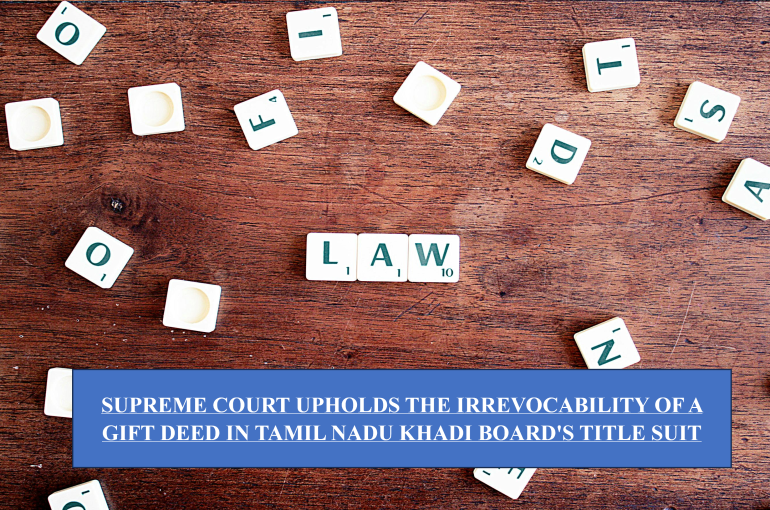SUPREME COURT UPHOLDS THE IRREVOCABILITY OF A GIFT DEED IN TAMIL NADU KHADI BOARD’S TITLE SUIT
Introduction:
In the matter of N. Thajudeen v. Tamil Nadu Khadi and Village Industries Board (2024 INSC 817) the Division Bench lead by Justice Pankaj Mithal and Justice Ujjal Bhuyan of the Hon’ble Supreme Court vide Order dated 24.10.2024, addressed a key legal issue pertaining to gift deed validity, acceptance, revocation rights, and the limitations on seeking declaratory relief for title and possession.
Facts:
In 1983, the Appellant, executed a registered gift deed (Gift Deed/Deed) transferring a property to Tamil Nadu Khadi Board the Respondent. This Deed allowed the property to be used for manufacturing Khadi products, explicitly stipulating that neither Thajudeen nor his legal heirs would retain any rights to the property. In 1987, however, Thajudeen issued a deed revoking this gift, asserting that the conditions of the gift had not been honored.
The Tamil Nadu Khadi and Village Industries Board challenged the revocation by filing a suit for title declaration and recovery of possession. The trial court dismissed this suit, citing insufficient evidence of acceptance of the gift. However, on appeal, both the District Court and subsequently the High Court ruled in favor of the Khadi Board, affirming the validity of the Gift Deed and dismissing the defendant’s revocation. Thajudeen appealed to the Supreme Court, where the case was heard in 2024.
Appellant’s Arguements:
The Appellant argued that the Gift Deed was not validly accepted by the Khadi Board, thus failing a crucial requirement for the transfer of title. He claimed the absence of any concrete action or explicit documentation to indicate acceptance and fulfillment of the gift’s purpose.
Thajudeen contended that he retained the right to revoke the gift, as the Respondent had allegedly failed to use the property for Khadi manufacturing, which he argued amounted to a failure of the Deed’s purpose. He claimed that his 1987 revocation deed was valid and restored his rights to the property.
The Appellant asserted that the suit was barred by limitation, as it had not been filed within the prescribed period following his 1987 revocation.
Respondent’s Arguments:
The Respondent argued that the Gift Deed was validly accepted. They pointed to their actions following the execution of the Gift Deed, such as applying for property mutation with revenue authorities and beginning construction on the land for Khadi-related purposes. They submitted documentary evidence (Exhibits A-2 to A-4) proving possession was taken and that steps were undertaken to honour the gift’s intended purpose.
The Khadi Board argued that the Gift Deed was irrevocable, as it contained no clause permitting revocation. Citing Section 126 of the Transfer of Property Act, 1882, they contended that once the Gift was made and accepted, Thajudeen lost any right to revoke it unilaterally.
The Board contended that their suit was within the limitation period. Since the suit was not only for a declaratory judgment but also for possession, they argued that a 12-year limitation period applied, making their filing timely.
Issues:
1. Whether the Gift Deed executed on March 5, 1983, was validly accepted and acted upon by the Tamil Nadu Khadi and Village Industries Board.
2. Whether the Gift Deed was revocable in light of the Appellant’s unilateral revocation deed in 1987.
3. Whether the suit filed by the Respondent in 1991 was barred by the statute of limitation.
Supreme Court’s Analysis
The Court examined the Gift Deed and evidence presented. The Deed explicitly mentioned that the Khadi Board had accepted the property for Khadi manufacturing, thereby satisfying the acceptance requirement. Additionally, the Khadi Board’s actions—applying for mutation and commencing construction—served as clear evidence of possession and acceptance. Based on this, the Court upheld that the Gift Deed was duly accepted and acted upon by the Respondent.
In its analysis, the Court referenced Section 126 of the Transfer of Property Act, which limits conditions under which a gift can be revoked. A gift can only be revoked if:
1. there is an agreement for revocation upon a specified event;
2. the gift is revocable at the will of the donor (which is void if agreed upon); or
3. it is possible to rescind the gift in a manner akin to rescinding a contract.
The Court observed that the Deed contained no clause permitting revocation, nor did the parties agree to any revocable conditions. Consequently, none of the exceptions under Section 126 applied, making the revocation deed issued in 1987 void ab initio (invalid from the beginning).
The Court clarified that when a suit seeks both a declaratory relief (title) and additional relief (possession), the limitation period is determined by the latter. Since possession claims are governed by a 12-year limitation period under Article 65 of the Limitation Act, 1963, the Khadi Board’s suit filed in 1991 was within the permissible time frame. This analysis overruled the trial court’s initial finding that the suit was time-barred.
Judgment
The Supreme Court dismissed the appeal and upheld the first appellate court and High Court’s judgments, affirming the plaintiff’s title to the property. The ruling emphasized that the Gift Deed was irrevocable due to the absence of any clause or agreement permitting revocation. The Court also reiterated that the 12-year limitation period for possession claims rendered the suit timely.
In the final order, the Court declared the Appellant’s Revocation Deed void, establishing the Respondent’s absolute right to the property under the 1983 Gift Deed.
Ashita
Associate
The Indian Lawyer & Allied Servcies.





































Leave a Reply